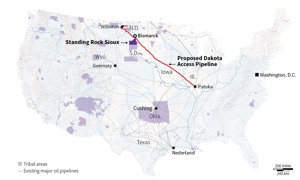US Federal appeals court hears arguments over Dakota Access pipeline
(Reuters) Three federal appeals judges in Washington, DC, heard arguments last week over whether to stop work on a crude oil pipeline in parts of North Dakota where the Standing Rock Sioux and other tribes say the project will desecrate sacred land.
The judges are not expected to rule for months. In September, they ordered the group of firms building the pipeline, led by Energy Transfer Partners LP, to pause construction on the disputed section of the route while they consider the tribes' request that the U.S. government withdraw permits for the project.
Opponents of the 1,100 mile, $3.7-B pipeline celebrated in September when legal challenges and violent clashes between protesters and security guards prompted the administration of President Barack Obama to ask the company to stop work on the disputed land while the government revisited its previous decisions about the project.
The US Army Corps of Engineers is also deciding whether to grant an easement to build under a lake on the Missouri River. Energy Transfer Partners needs that final permission in order to complete the pipeline, which is currently due for delivery on January 1, 2017, according to court records.
An attorney for the pipeline company said under questioning from the judges at Wednesday's hearing that if the court allowed it, the company would continue building up to the lake's edge even before the easement decision, because each extra month of delay will cost the company more than $80 M.
Jan Hasselman, the attorney for the Standing Rock Sioux, told reporters outside the courthouse after the hearing that the appeal "should take three or four months" to resolve.
Standing Rock Sioux Tribal Chairman Dave Archambault said after the hearing that 135 anti-pipeline demonstrators have been arrested so far, and that law enforcement officers are "heightening the danger" by using anti-riot gear.
In late September, there was no visible evidence that construction was ongoing at the pipeline site near the Missouri River, although parts of the construction site are on private land and therefore inaccessible.
Reporting by Julia Harte; Additional reporting by Ernest Scheyder; Editing by Matthew Lewis







Comments